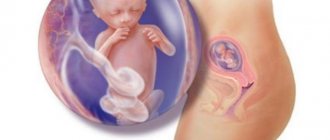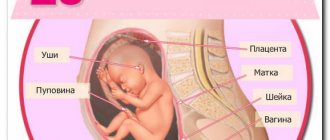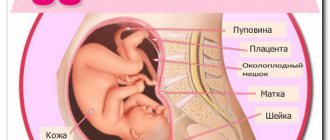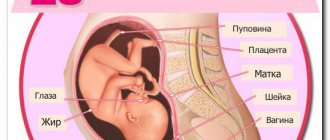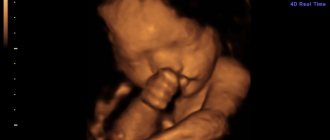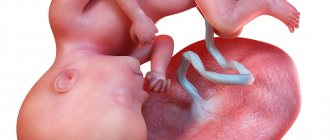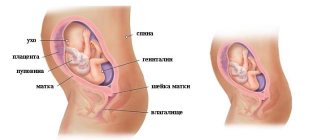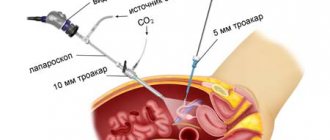Ultrasound at the 11th week of pregnancy is a unique research method that allows you to organize the first meeting of the expectant mother with her unborn baby. In addition to the fact that ultrasound diagnostics introduces native hearts to each other, it also helps specialists monitoring the condition of a pregnant patient to study vital signs of fetal development.
Perhaps many ladies before an ultrasound session experience anxiety associated with the unknown, but, one way or another, the procedure must be carried out. It is in the eleventh week that the doctor can timely determine whether the child’s formation parameters correspond to the established norm.
Why and to whom is ultrasound diagnostics recommended?
It is usually recommended to conduct an examination at 12 weeks of pregnancy - screening. Ultrasound is considered routine and is performed in a standard manner.
But at week 11, research may be no less necessary for the following reasons:
- make sure that the child does not have any pathologies;
- there are no genetic mutations;
- exclude the presence of Down syndrome and other chromosomal abnormalities;
- determine the location of organs and learn more about their structure.
Reference ! An ultrasound can be performed at 11 weeks even if no examination has been performed previously and the gestational age is determined incorrectly.
The procedure can be recommended to any woman who is in an “interesting situation.” Because the 11th week of pregnancy is a kind of turning point. At this stage, the formation of the fetus is considered completely complete, and after that the child will grow and develop, gradually increasing in size.
After receiving the results of the study, the expectant mother may be referred for a consultation with a geneticist. The consultation can be planned or emergency, depending on the results of the ultrasound.
What do bad ultrasound results mean?
Firstly, that additional examination will be required. This is a good thing because the fetus and mother will be examined in more detail. There is a possibility of excluding the first opinion, which may be erroneous.
Secondly, if an ultrasound of the fetus in the first trimester of pregnancy is not reassuring with the results, then you need to contact a geneticist. He will prescribe additional tests for a more accurate examination: placental villous biopsy, cordocentesis or amniocentesis. Based on these results, recommendations are given to parents.
Mother's condition and how the fetus develops
You can describe the condition of the expectant mother in one word - fatigue. This is not surprising, because some women compare pregnancy to working in a factory.
In addition to weakness, a pregnant woman may complain of:
- toxicosis and its main symptoms (attacks of vomiting or nausea);
- frequent urination (the reason here is not kidney or bladder disease, but a high level of the hCG hormone in the blood);
- pain in the area of the mammary glands (at this stage breast enlargement is already noticeable, but touching it is extremely unpleasant: the woman may feel pain and tension);
- change in the taste of food (smells seem sharp and unpleasant);
- increase in body temperature to 37.4 degrees;
- increase in abdominal volume.
Many mothers believe that the tummy grows with the baby. This is true, but at 11 weeks of pregnancy the fetus is still too small. And an increase in abdominal volume is associated with an increase in the concentration of the hormone progesterone in the blood. It is this that causes the intestines to work more slowly, resulting in gas formation, digestive problems and, as a result, bloating.
During this period, the placenta begins to form, which will protect the baby throughout the rest of the pregnancy. The yolk sac is still preserved in the uterus, but it no longer functions.
The fetus is fully formed, as are all its internal organs.
Condition of the fetus at the 11th week of development
During this period, the unborn baby grows and develops rapidly. The mother's body still has a visible yolk sac, but it no longer functions.
The volume of the head is still very large in relation to the size of the entire body. During this period, intensive development of the brain is observed. The neck muscles are gradually strengthening. The fetus can already raise its head a little.
By the 11th week, the fetus has already formed its tongue, ears, nasal passages, and palate. The iris of the eye begins to form. The color of the child's eyes will depend on it. The photo already shows interesting facial contours. It is flat during this period with narrow, widened eyes, as well as drooping ears. The first photo of the unborn child looks very unusual.
There are no more membranes between the fingers. Nails are already forming, as well as hair follicles. If the sex of the baby is female, then the ovaries begin to develop. By this time, the genital organs of different sexes are slightly different. A child's muscles develop very quickly. He becomes active and mobile, although the expectant mother does not feel the movements of the fetus due to its small size.
At this time, the baby’s liver is actively growing. It already makes up about 10% of the total body volume. Thanks to this organ, the baby begins to excrete waste products into the mother’s body. Contractile movements of the intestines begin to appear, similar to peristalsis.
At 11 weeks the fetus is able to swallow. He swallows amniotic fluid and feels its taste. The baby is also capable of hiccups. This is ensured by a well-developed diaphragm.
The sex of the fetus has already been formed, but it is still quite difficult to determine it on ultrasound.
What does the study show?
Ultrasound diagnostics will help determine in a pregnant woman at 11 weeks:
- Number of fetuses in the uterus. If the pregnancy is multiple, then the exact location of each baby is determined and the formation of the placenta is monitored. If the pregnancy is not multiple, then attention is also paid to the location of the fetus and placenta.
- Presence of an ectopic pregnancy. The period is short, but the pregnancy moves into the 2nd trimester, for this reason it is worth eliminating the possibility of an ectopic pregnancy completely.
- The exact date and date of the expected birth. With the help of ultrasound, such calculations are distinguished not only by the greatest accuracy, but also by ease of execution, which eliminates errors.
- The presence or absence of chromosomal pathologies in the fetus.
- At what frequency does the child’s heart beat?
- The presence or absence of pathological changes in the functioning of internal organs.
Reference! By doing an ultrasound, you can learn a lot about the condition of the fetus and its development, as well as get the first photo.
But it is unlikely that it will be possible to determine the sex of the child at this stage of development; you will have to wait for the next examination. But it happens that good specialists, already at a given time, according to certain parameters, can accurately guess who will be a boy or a girl.
Purpose of the study
As mentioned earlier, sonography has several purposes related to the health of the developing organism. It is thanks to this diagnosis that the main forms of the disorder are identified, some of which can be prevented at this stage.
Characteristics of basic measurements
First of all, the specialist assesses the location of the embryo, which can be located in different parts of the uterus. At this time, the number of fetuses in the hollow organ is diagnosed: if there are, for example, twins or triplets in the womb, the sonologist carefully examines the presence/absence of a common placenta and the relative position. Siamese twins are detected extremely rarely on ultrasound, but the possibility of their occurrence cannot be completely excluded.
Then the activity of the heart and the degree of activity of the baby are determined. One of the most important ultrasound parameters is CTR (coccygeal-parietal size) - this is the distance from the crown of the fetus to the coccygeal bone segment. Parents can familiarize themselves with normal indicators by examining the tabular data:
| Average statistical norm for fetal size (in mm) | Possible fluctuations (in mm) | Appropriate gestational age (10 weeks +…) |
| 33.0 | 28.0–39.2 | 1 day |
| 35.2 | 29.5–40.5 | 2 days |
| 36.7 | 31.0–42.5 | 3 days |
| 38.3 | 32.5–44.0 | 4 days |
| 39.9 | 34.0–45.6 | 5 days |
| 41.5 | 35.5–47.2 | 6 days |
| 43.0 | 37.0–49.1 | Exactly 11 weeks |
A distinctive feature of the functioning of the heart is a distinct loud beating. Determination of heart rate (heart rate) is also made by comparing the data of a particular child with ultrasound parameters prescribed in medical tables. The norm is considered to be 153–170 beats/min. It should be noted that the rhythm should be clear - even minor interruptions may indicate the onset of the development of cardiovascular pathologies.
The thickness of the nasal tubercle is also measured (at this stage of development it is still impossible to talk about the formation of a full-fledged olfactory organ). The rendered ultrasound image should show a spout raised by 1 mm. Along with the above indicators, there is an equally significant one - TVP (or thickness of the collar space). It allows you to assess the condition of the neck area adjacent to the spine.
The normal digital index is 1.5 mm. In some cases, an error of 0.8 to 2.4 mm is quite appropriate. Swelling, excessive thickening or unnatural shortening of the neck indicates the presence of abnormalities. The gender of the child cannot be determined at this stage. In both girls and boys, at 11 weeks of development, only a small, indistinguishable formation is visible in the groin area.
Detection of pathologies
It is mandatory for specialists to measure markers of genetic disorders. With their help, ultrasound can detect the most dangerous pathologies caused by chromosome deformation. The most common diseases in this group cannot be corrected:
| Name of the disease (syndrome...) | Physiological signs of anomaly | Life expectancy |
| Turner | Low BMI, excess skin on the neck, high blood pressure, lymphostasis, mental retardation, short stature, underdevelopment of the genital organs, disorders of the central nervous system or musculoskeletal system. There are known cases of complete preservation of intellectual abilities | If a child does not have extremely severe pathologies, he will be able to live a full life |
| Patau | Severe mental retardation, shortened neck, accessory spleen, enlarged kidneys, wide nose, deformed ears, microcephaly, underweight. Some are born with severe cyclopia | 94–95% - up to 1 year; 14–16% - up to 5 years; 2–3% - up to 10 years |
| Down | Brachycephaly, short limbs, flattened face, hypotonia of muscles, chronically open mouth, flat bridge of the nose, short neck and strabismus. In 65–68% of cases, children over 7–8 years of age develop cataracts | People suffering from this pathology often live long lives. However, many people develop dementia after 45–50 years of age |
| Cornelia de Langhe | Thin upper lip, microcephaly, astigmatism, myopia, hypertrichosis (excessive hair growth), seizures, short feet and hands, random teething, fused eyebrows and mental retardation | With the proper attitude of parents towards the upbringing and health of the baby, the likelihood of a favorable prognosis increases |
| Edwards | Absence of lobes, cerebellar hypoplasia, small mouth, underdeveloped lower jaw, skull deformation, wide chest, heart defect, modified feet | 59–60% - up to 3 months; 5–10% - up to 1 year. Others are affected by mental retardation |
How do they do it?
The procedure is carried out in 2 ways: transvaginal and through the anterior abdominal wall. In the first case, the patient is placed on the couch and asked to bend her knees. The woman will have to remove her underwear because the sensor in the disposable condom will be inserted into the vagina. The procedure will not cause any discomfort and should not cause pain or discomfort.
The second method of conducting research is more familiar. The patient is placed on her back and asked to free her stomach from clothing. A special gel is applied to the stomach and with the help of a sensor they learn more about the condition of the fetus and the expectant mother.
Sex at 11 weeks pregnant
It has been proven that if pregnancy proceeds normally, sex only brings benefits. During physical intimacy, lubricant and sperm are released, which have a positive effect on the condition of the uterus. Of course, you need to exercise some caution and use positions with shallow penetration.
If there is a threat of interruption or pain, then it is better to refrain from intimacy.
But in most cases, it is good for both the physical and psychological state of a woman, in addition, during pregnancy, libido increases in some women.
Is it possible to do screening at 11 weeks?
A blood test for the presence of genetic and chromosomal disorders is carried out at 10 to 14 weeks. It helps to identify the presence of pathology in the fetus at an early stage.
Screening consists of 2 examinations:
- you will have to donate blood from a vein (biochemical analysis);
- do an ultrasound.
The analysis is considered planned; screening will be carried out twice during the period of pregnancy.
The study is informative and helps determine the presence of pathologies in the fetus.
Indications for additional tests include: the age of the expectant mother, the presence of abortions or miscarriages.
If one of the two results is abnormal, the pregnant woman is referred for consultation with a geneticist.
What's happening to mom
Throughout the first trimester, a woman’s body gradually adapts and prepares for a new role. All organs and systems of a woman’s body at this moment will draw on special, reserve reserves to ensure all the functions of her own body and the child’s body.
At this moment, the mother’s well-being, as a rule, improves significantly:
- the intensity of toxicosis decreases;
- hormonal levels gradually normalize;
- the psycho-emotional state returns to normal;
- The overall tone of the body increases.
At this moment, the uterus reaches a significant size and occupies all the free space in the pelvic organs. In girls with a slender physique, the stomach is significantly rounded.
At this stage, colostrum begins to be released from the mammary gland. There is no need to specifically express it; this is a natural process. This change is the result of the activity of the hormone prolactin. If the discharge is quite voluminous, uncontrollable and bothers the girl, you should purchase disposable hygienic bra pads.
At this stage of pregnancy, symptoms of vitamin deficiency may appear:
- brittle nails;
- pigmentation;
- change in hair condition;
- hair loss;
- dry skin;
- tooth sensitivity.
In order to normalize the patient’s condition, nutrition should be rationalized. In addition to eating foods rich in natural calcium, you should take vitamin complexes.
Attention! Before using vitamins and dietary supplements, you should consult your doctor.
Lack of calcium in the body is a periodic disorder. The balance of the necessary element will return to normal on its own after pregnancy is completed.
What can be seen in the photo of the fetus?
If at an early stage mom and dad may be a little disappointed with the ultrasound photo, then at week 11 the photo will show:
- where in the uterus the fetus is located;
- how many babies should we expect;
- child, his arms and legs.
Already visually the baby resembles not a pea, but a fully formed child, only very small.
In the photo of 11 weeks you can see black dots - eyes, indentations on the sides of the head - ears, a small nose and mouth. But it’s not yet possible to find out who the future son or daughter is like.
Nutrition and regime in the first trimester
These two factors largely determine the woman’s well-being and the baby’s development. Nutrition in the first trimester should be rich in vitamins, macro- and microelements. At this stage, the basic systems and organs of the child are formed, so it is important to provide him with everything he needs.
During this period, you should rely on cereals, whole grain bread, fresh vegetables and fruits. Right now, sudden food preferences are forming. The desire to lick whitewash or drink beer only indicates that the body lacks some substances. Such needs are regulated by taking vitamins or dietary supplements.
Important: it is better to exclude sweets, they can provoke increased toxicosis.
As for the regimen, in the early stages there is a fairly high risk of pregnancy failure. Therefore, you should not overwork yourself with physical work or lift weights. During this period, a woman most often experiences weakness and drowsiness. If possible, you should give your body rest and get a good night's sleep.
Normal indicators: fetal size
The 11th week of pregnancy is special, because at this stage the child is no longer called an embryo and begins to be called a fetus. Despite the fact that the baby's weight does not yet exceed 5 grams, he already has arms, legs and even fingers.
By studying the results of the study, you can obtain the following information:
- fetal heart rate varies from 153 to 177 beats per minute;
- fetal size (FSR) from 44 to 68 mm;
- weight from 8 to 11 grams;
- the volume of amniotic fluid is about 20 ml;
- presence of a nasal bone;
- indicate how many vessels are in the umbilical cord and whether it wraps around the fetal neck.
Important! It is recommended to give the obtained ultrasound result to a doctor for decoding, and not to do it yourself. This way the expectant mother can avoid unnecessary worry.
The doctor must also write whether gross malformations of internal organs were detected or whether none were detected.
Possible problems
Pain
From time to time, a woman may experience discomfort associated with symptoms of pregnancy. If pain of a different nature occurs in a particular area, you need to know which of them are considered normal and which are regarded as pathology.
- Pain in the abdomen and lower back is usually associated with the tone of the uterus. This is par for the course when you are in your 11th week of pregnancy. Moderate abdominal pain should not cause concern, but if it intensifies or occurs too frequently, it is better to consult a doctor. Perhaps this is a threat of miscarriage, which requires immediate medical treatment.
- Leg pain causes cramps. These are frequent companions of pregnancy, which in severe cases can bother a woman throughout the entire period of pregnancy. One of the reasons is calcium deficiency in the body. Swelling of the legs can also cause discomfort.
- Pain in the anus is associated with the appearance of hemorrhoids. This disease is common in pregnant women due to frequent constipation and decreased physical activity.
Colds and fever
It is quite difficult to avoid colds during pregnancy. Sooner or later, this scourge overcomes the expectant mother and it is important to have an idea of how to deal with it. The most important rule is not to take medications without a doctor’s prescription. Only a doctor can assess the state of your health and determine the balance of benefits and harms of a particular medication.
- Traditionally, doctors recommend turning to traditional medicine for colds. Gargling and inhalation with herbal infusions will not harm the health of the pregnant woman and child.
- During illness, drinking plenty of fluids is recommended; healthy drinks include teas with honey, warm milk, and berry fruit drinks.
- If the temperature rises above 37.7 degrees, you should immediately call a doctor to exclude the possibility of spontaneous miscarriage. Before the doctor arrives, you can take paracetamol.
- If the thermometer shows 37-37.2 degrees, there is no need to worry. A slightly elevated body temperature during pregnancy does not entail serious consequences.
Discharge at the 11th obstetric week
Despite the fact that the critical period of pregnancy, which falls in the first trimester, is left behind, the expectant mother should exercise caution and also carefully monitor the nature of the discharge from the genital tract. At this stage, they are considered normal if they are uniform and light.
If you detect any other discharge (brown, yellowish, red, green), you need to contact a gynecologist.
In addition, itching in the perineum, pain in the lower abdomen, and the appearance of a strong odor from the vagina should cause alarm. These symptoms may indicate a threat of miscarriage or infection.
Bleeding
Unfortunately, bleeding during pregnancy is a fairly common occurrence that requires immediate medical attention.
The gynecologist, after examining the patient and additional examination using ultrasound, will be able to give a final conclusion about the cause of the appearance of blood from the vagina.
The occurrence of bleeding when the 11th obstetric week of pregnancy occurs can be caused by various factors:
- Pathology of the pregnant uterus.
If a woman has myomatous or fibromatous nodes on the uterus, and the embryo is implanted in close proximity to them, bleeding may occur. - Mechanical damage.
The cervix is sensitive and vulnerable during this period, which means any careless action (for example, during sexual intercourse) can lead to damage. - Lack of the hormone progesterone.
Causes thinning of the endometrium and detachment of the embryo from the uterine wall. - Frozen pregnancy.
If the fetus has stopped developing, then the woman’s body begins to reject the embryo, causing bleeding.
Twins
A multiple pregnancy follows almost the same scenario as a single pregnancy. But there are also some differences. For example, the burden that falls on the expectant mother. Naturally, during pregnancy with twins, it is much larger. To provide both fetuses with nutrients, vitamins and microelements, a woman needs to make a lot of effort. In addition, do not forget that with multiple births, labor rarely begins on time. As a rule, doctors and the pregnant woman herself are prepared for premature birth. By this time, the gynecologist must determine how they will pass: naturally or through a cesarean section.
Possible contraindications
There are no special contraindications for the procedure.
But there are exceptions in which ultrasound is not recommended, for example:
- If there is a threat of miscarriage or uterine bleeding.
- If a woman has been diagnosed with gynecological diseases (we are talking about a study using the transvaginal method).
- If there is extensive damage to the skin of the expectant mother at the site where the gel is applied.
Since the examination is prescribed by a doctor, he takes into account all possible indications and contraindications for its implementation.
Preparation
Initially, you should try to find out from the doctors which of the 2 types of research will be used in relation to a particular patient. If we are talking about a conventional diagnostic method, you need to fill the bladder with regular still water approximately 1-2 hours before the session, and if you are talking about a transvaginal method, then a few minutes before the procedure you need, on the contrary, to empty the organ.
Sometimes during a transabdominal ultrasound, the specialist interrupts the procedure so that the woman can empty her bladder. This is due to the fact that the amount of amniotic fluid may be quite sufficient to perform high-quality ultrasound. 2-3 days before the ultrasound, it is worth minimizing the consumption of foods that provoke increased gas formation.
And since excessive restriction in the diet can negatively affect the development of the embryo, it is necessary to give up only a few foods - beans, peas, fast food, baked goods, fried and smoked foods, milk, soda water, cabbage. It is better to come for an ultrasound on an empty stomach.
If flatulence still manifests itself several hours before diagnosis, the pregnant woman can take the safest carminative drugs, for example, Iberogast or Espumisan. These drugs, according to pharmacists, penetrate into bubbles filled with gas and destroy them from the inside, but are not absorbed into the blood. You should also prepare the loosest possible clothing that will not compress certain areas of the body.
You need to take with you to the ultrasound session regular paper napkins designed to remove thick gel from the body, and a towel/oilcloth.
A potential father is also allowed to be present at the ultrasound session: he will be able not only to psychologically support his wife, but also to get to know his child
How to prepare for an ultrasound
Ultrasound of an 11-week fetus can be performed either with a standard surface probe or transvaginally. In the first case, the woman will have to endure some inconvenience - the study is carried out with a full bladder. Therefore, you will have to be patient and drink enough liquid. A couple of days before going to the office, you should exclude some foods that increase gas formation and fermentation (peas and legumes, highly carbonated drinks, etc.).
Transvaginal ultrasound, with direct insertion of the sensor into the vagina, does not require special preparation.
Proper nutrition and routine at 11 weeks
With improper and inadequate nutrition, in addition to the deterioration of hair and nails associated with hormonal changes, teeth can be destroyed. Therefore, a balanced diet and proper diet are the key to the health of both mother and baby. When compiling a diet, the emphasis should be on fresh fruits and vegetables, dairy products (cheese, feta cheese, cottage cheese). If you have low hemoglobin, you should include pomegranates, liver and other foods containing iron in your menu.
At the end of the first trimester, taking folic acid and vitamin E can be replaced with special vitamin complexes for pregnant women. In them, the dose of certain microelements is increased taking into account the needs of the female body and the growing baby.
The daily routine remains usual for a woman, the main thing is to listen to her body.
How is an ultrasound performed?
In the first three months of pregnancy, ultrasound can be performed in two ways. However, the preparation for them is slightly different, and the processes themselves are performed differently. How an ultrasound examination is performed is described in the table below.
| Procedure name | Method of carrying out the procedure |
| Transvaginal examination | This procedure is used mainly only in the period from the 10th to the 11th week, since the uterine cavity at this time is not located close to the peritoneal wall. Ultrasound is performed using a special sensor. A sterile condom is put on it and inserted into the vaginal area. A woman lies on a couch with her legs bent at the knees. |
| Transabdominal examination | The expectant mother lies on her back and gel is applied to her bare belly. It is in this area that the physician moves the sensor. |
Both of these research options are absolutely harmless and do not cause any pain. During an ultrasound, many women take photographs of the monitor screen, on which the image of the baby is visible, and some ask to print it out.
Transvaginal examination is often performed early in pregnancy
Recommendations
During pregnancy, a woman needs to monitor her health and lifestyle.
It is important to follow the useful recommendations of doctors so as not to disrupt the formation and growth of the fetus:
| Name | Description |
| Bad habits | Alcoholic drinks and tobacco products should be eliminated from life even at the stage of pregnancy planning. Nicotine and other toxic substances enter the baby’s body through the placenta along with the blood. This applies not only to active, but also to passive smoking. |
| Avoid stress | Emotional stress and severe disorders negatively affect blood circulation in the placenta. The gynecologist recommends staying calm during the 11th week of pregnancy and engaging in pleasant chores. You can go shopping, relax and read your favorite book. It is important to avoid places where large numbers of people gather. Lack of air can lead to increased symptoms of toxicosis. |
| Do a screening | Your gynecologist will tell you when it is best to do the test. In most cases, the examination is scheduled between 11-13 weeks. |
| Proper nutrition | During pregnancy, it is necessary to consume more foods that contain beneficial vitamins and microelements. You should avoid certain types of cheeses, coffee, and sweet carbonated drinks. Harmful foods can cause unwanted problems. It is recommended to exclude foods from the diet that can also cause an allergic reaction. |
| Favorite hobby | A hobby will allow you to be distracted from problems, relax more and be in harmony. Positive emotions are necessary not only for the mother, but also for the baby. |
| Vitamins | It is recommended to supplement proper nutrition with the intake of vitamin complexes, which will be selected by the doctor, taking into account the individual characteristics of the development of the fetus and the female body. |
| Physical exercise | A pregnant woman is recommended to walk more in the fresh air, do yoga, swimming or special gymnastics. |
| Comfortable clothes | Despite the short period of time, the expectant mother is recommended to update her wardrobe. Clothing should be comfortable so that it physiologically correctly supports not only the stomach, but also the chest. |
| Taking care of your health | While carrying a baby, the expectant mother should avoid public places, especially during epidemics of viral diseases. There is a high probability of getting sick, and it is undesirable to be treated with medications. The use of folk remedies should also be discussed with your doctor. |
Experts recommend that the expectant mother read useful literature regarding caring for the baby after he is born. New knowledge will help strengthen your strength and get rid of uncertainty. You can study literature or watch special films.
After eating, a woman sometimes experiences a burning sensation in the chest - this is heartburn. You can prevent discomfort and unpleasant sensations if you eat food in frequent, small portions (4-5 rubles per day). It is recommended to dilute natural juices with water in equal proportions (1:1), since the digestive system releases a large number of enzymes to digest them.
Pregnancy at 11 weeks is a difficult test for all family members. A woman demands maximum attention. In the photo you can see not only the rounding of the abdomen, but also a change in the shape of the buttocks and legs. It is also important to be registered with a gynecologist in order to promptly identify pathological processes and begin treatment.
